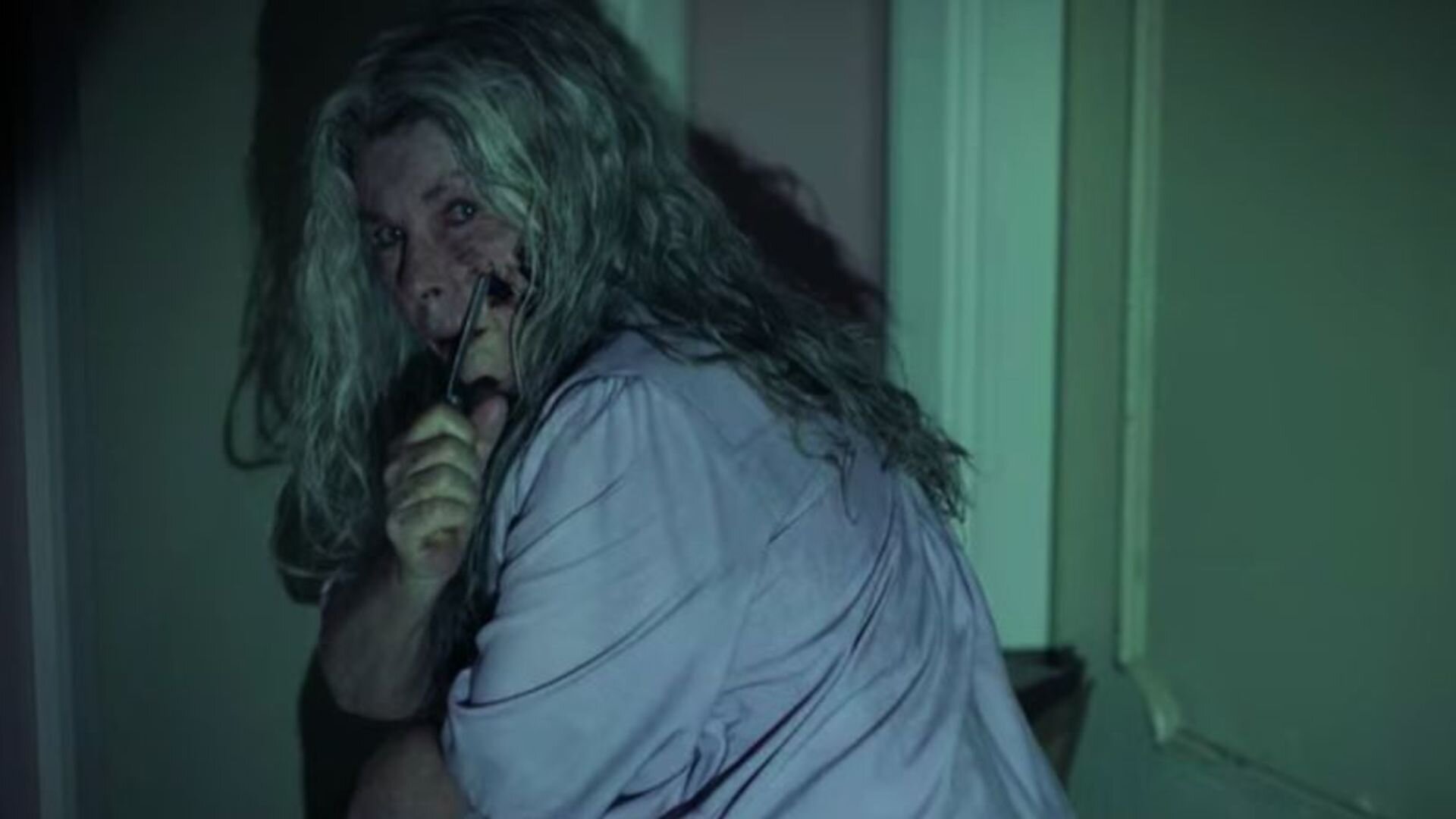[Film Review] Relic (2020)
For many, the concept of aging can seem like an inevitable, terrifying reality. But for others, aging threatens more than just fine lines and greying hair. Director Natalie Erika James tackles the unseen horrors of aging with her first feature-length film Relic (2020), an unlikely ghost story that brings a haunting into the subconscious.
When Edna (Robyn Nevin), a doting grandmother, seemingly goes missing, her detached daughter and granddaughter must piece together the remnants of her home life. But when she finally returns, her family realizes that something has taken over both her and her home. Relic explores the unyielding complexities of generational trauma and the importance of family.
Erika James has built a career around connecting age, family, and the subtlety of fear. Her shorts Creswick (2017) and Drum Wave (2018) both explore the complexities behind the cultural responsibilities of family. These films use ambiguous sources of fear as thinly veiled metaphors for interpersonal and familial issues. Relic (2020) is her first feature-length film to follow in the same deep-rooted, visually-provocative storytelling style.
Edna’s character, who’s initially framed as a beloved elderly woman, is slowly coded with alzheimer’s. Although her home is traditional and welcoming, there are small glimpses of uncertainty strewn throughout her belongings. She leaves instructions on sticky notes around her home to “take pills” and “flush”, but as the film progresses these simple reminders turn into ominous threats like “don’t follow it” and “the walls are moving.” The progression of Edna’s disease becomes increasingly apparent through her erratic behaviors, but also through the sudden appearance of a sinister presence.
Relic relies heavily on the interpretation of visual metaphors, which are interwoven into the lives of the three main characters. The sudden onset of Edna’s alzheimers coincides with the arrival of the apparition, creating a link between Edna’s physical home and her mind. As her mental health begins to deteriorate, so does her house. Her granddaughter Sam (Bella Heathcote) is the first to notice large patches of mold slowly spreading throughout her home, which eventually escalates to different structural damages. These dark mold spores parallel the violent bruising that appears across Edna’s body. When Sam becomes trapped within the walls, unable to escape, it parallels the deterioration of Edna’s mind. Her home, like her mind, is crumbling.
The visual composition and framing are where the Australian film truly shines. Without compelling visuals, the underlying metaphors would seem underdeveloped and vapid. Erika James utilizes highly contrasted shadowing to hide ambiguous horror elements without resorting to cliché jumpscares. There are moments of impressive sfx and prosthetic makeup, especially in dream sequences and the final scene. Robyn Nevin also gives an incredible performance as her character descends into a catatonic, possessed state.
Still, the heavy reliance on metaphors can come off as pretentious, especially when paired with the intensity of the final scene. Certain cuts and dream sequences seem jarring and without merit, falling into the same pitfalls as Darren Aronofsky’s Mother! (2017). Relic, although visually impressive, also has questionable writing choices. There are certain reactions from Edna’s daughter, Kay (Emily Mortimer), that don’t make sense in the context of the film or established relationships. The lack of an intimately close relationship with her mother may lend itself to the guilt-ridden tension associated with Edna’s decline, but it also doesn’t provide a definitive baseline to the emotions the audience is supposed to associate with scenes.
At its core, Relic isn’t about a vengeful spirit or dark family secret. Edna and her family aren’t being punished for a long-forgotten crime or unknowingly making sacrifices for a pagan cult. These women are just continuing the line of generational trauma. Edna, Sam, and Kay are haunted by their own generational inheritance, whether it be disease, grief, or regret. Aging isn’t the kind of villain that you can outrun.






![[Film Review] Flights of Reverie (2025)](https://images.squarespace-cdn.com/content/v1/5fe76a518d20536a3fbd7246/1769111579457-CTUW03G3J34P6SFRWWEM/flights-of-reverie-filmstill-ornithologist-berlin-li-wallis06.jpg)
![[Film Review] Confessions in Static (2025)](https://images.squarespace-cdn.com/content/v1/5fe76a518d20536a3fbd7246/1768397467245-3KOF3LUBRDQVJ8QVDONA/Confessions_Key_Alternate_1920x1080.png)
![[Film Review] Stalker (2025)](https://images.squarespace-cdn.com/content/v1/5fe76a518d20536a3fbd7246/1768232505839-TS9K7YBLOXNQML8PUWTP/Screenshot+2026-01-12+at+15.17.49.png)
![[Film Review] Bone Lake (2025)](https://images.squarespace-cdn.com/content/v1/5fe76a518d20536a3fbd7246/1768151214859-U1AUN7JALKRK4W5NGJVH/Andra+Nechita+and+Maddie+Hasson+in+Bone+Lake+%28Signature+Entertainment%29+1.jpg)
![[Film Review] 28 Years Later: The Bone Temple (2026)](https://images.squarespace-cdn.com/content/v1/5fe76a518d20536a3fbd7246/1768152692285-7TK6SN62JY4H3TJDYABP/The+Bone+temple.jpg)
![[Film Review] Pelverata (2025)](https://images.squarespace-cdn.com/content/v1/5fe76a518d20536a3fbd7246/1767549668681-1TW6BD7QQHK8WS8L4IVT/Screenshot+2026-01-04+at+17.57.01.png)
![[Film Review] A study of the human ability to endure self-inflicted pain in XXXDarknet: Red Lips](https://images.squarespace-cdn.com/content/v1/5fe76a518d20536a3fbd7246/1767542371615-YUJBD442MS9NAGEB45D7/redlips.jpg)














![[Editorial] Oscar Nominations 2026: Where to stream all the horror picks](https://images.squarespace-cdn.com/content/v1/5fe76a518d20536a3fbd7246/1769113319180-4INRRNMZK4DZLHRSUXX5/rev-1-GRC-TT-0026r_High_Res_JPEG-1024x372.jpeg)
![[Editorial] 10 Films & Events to Catch at Soho Horror Film Fest 2023](https://images.squarespace-cdn.com/content/v1/5fe76a518d20536a3fbd7246/1700819417135-299R7L4P0B676AD3RO1X/Screenshot+2023-11-24+at+09.41.52.png)
![[Editorial] 9 Horror Nintendo Switch Games To Play](https://images.squarespace-cdn.com/content/v1/5fe76a518d20536a3fbd7246/1697214470057-3XZXX8N4LYIMDFWS6Z3P/Screenshot+2023-10-13+at+17.20.13.png)
![[Mother of Fears] Mothering in Silence in A Quiet Place (2018)](https://images.squarespace-cdn.com/content/v1/5fe76a518d20536a3fbd7246/1696445921315-HZJ2DZYQIH6VVWXBO2YL/Screenshot+2023-10-04+at+19.52.29.png)
![[Editorial] 5 Female Focused Horror Book Recommendations](https://images.squarespace-cdn.com/content/v1/5fe76a518d20536a3fbd7246/1696441981361-52EQCTJ7AT2QF1927GM7/919xtm6d3fL._AC_UF894%2C1000_QL80_.jpg)
![[Editorial] 9 Best Slashers Released Within 10 Years of Scream (1996)](https://images.squarespace-cdn.com/content/v1/5fe76a518d20536a3fbd7246/1695478839037-LOFHGVM3H6BMSZW7G83M/Screenshot+2023-09-23+at+15.15.11.png)
![[Mother of Fears] Mother Vs. Monster in Silent Hill (2006)](https://images.squarespace-cdn.com/content/v1/5fe76a518d20536a3fbd7246/1695485781119-H6GNP0G3J2TLPAOIABV7/Screenshot+2023-09-23+at+17.11.56.png)
![[Editorial] 9 Terrifying Cerebral Visions in Horror Movies](https://images.squarespace-cdn.com/content/v1/5fe76a518d20536a3fbd7246/1693509801235-X23OL50T1DVGECH0ZJK2/MV5BMjQ0MTg2MjQ4MV5BMl5BanBnXkFtZTgwMTU3NDgxMTI%40._V1_.jpg)

The life of a Silent Hill fan is a turbulent one. For every Silent Hill 3, there’s a Silent Hill: Homecoming. For every Silent Hill 2 Remake, there’s a Silent Hill: Ascension. For every Silent Hill f, there’s a Return to Silent Hill, and thus, the pendulum continues to swing, this time into frustrating - but expected - disappointment.